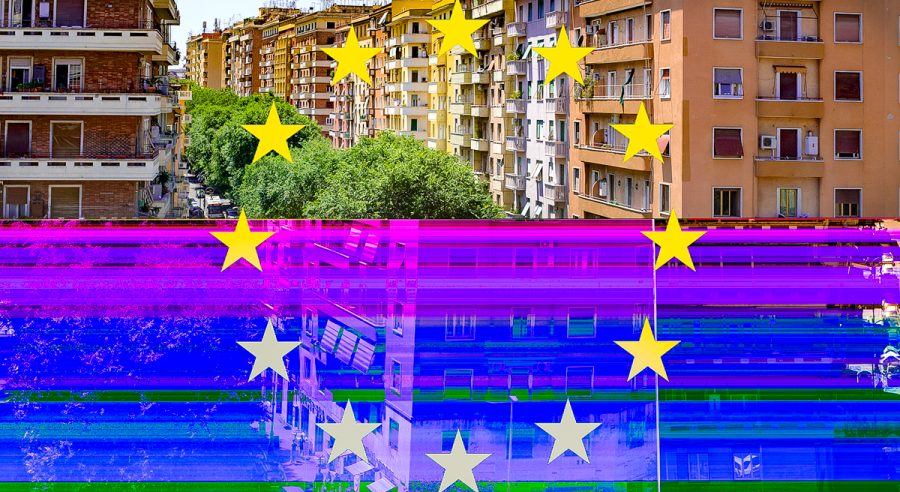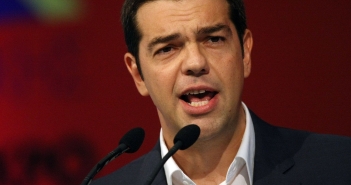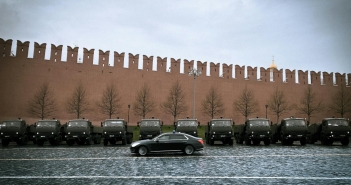This is an abridged interview with jurist Laurent Pech, Professor of European Law, Jean Monnet Chair of European Public Law (2014-17), and Head of the Law and Politics Department at Middlesex University London. Professor Pech identifies rapid autocrisation in a number of EU states, particularly Hungary and Poland, where the Rule of Law has been undermined in a three stage process that has been exacerbated by the emergency conditions of the pandemic.
On Mandatory Hotel Quarantines
Technically it has always been possible for national authorities to restrict EU free movement rights on a number of grounds, such as public health. But EU law is normally opposed to collective measures. So you can only restrict on a number of grounds the exercise of free movement on a case by case basis. And you must always comply with the principle of proportionality, so you cannot impose disproportionate measures in the name of public health. You have to have a compelling reasons and you have to demonstrate them on a case by case basis. I’m not familiar with the measures contemplated by the Irish government …
Without knowing the details of any general policy of containing EU citizens or more generally, [a mandatory hotel quarantine for] EU residents, regardless of citizenship, in my view, would not be compatible with the law, as I understand it.
What I can tell you is that public health can only be used as a grant of derogation for individual cases, not for the blanket prohibition on arrivals from other EU countries. I don’t think … the European Commission, would let it fly.
…
I’m not familiar with any [other] EU country … which is essentially preventing residents in the EU from travelling as a collectively speaking, as a country, imposing on EU residents, trying to get to another EU country and then the mandatory quarantine.
On the Rule of Law
I can tell you what the Rule of Law is in EU law in the law of the European Convention on Human Rights, in fact, in our Constitution, constitutional law … the case law has defined the rule of law quite compellingly. Why are we debating these days the definition of the rule of law?
…
the concept is being challenged, especially from current authorities in Warsaw and Budapest. The argument is the Rule of Law is too vague and meaningless. It does not exist. And it’s just kind of an intellectual subterfuge to impose neoliberal policies or whatever. But as a matter of EU law, actually, the Rule of Law can be defined. It’s normally defined, understood as a set of legal principles, such as the principle of legal certainty, the principle of judicial review before independent courts, respect for human rights, these kind of principles.
…
The Rule of Law is to be found in the EU treaties and has been exhaustively defined both in EU legislation and in the case of the European Court of Justice.
…
The essence of the Rule of Law is that we have rules to prevent the abuse of power so we can do something about the abuse of power. We can fight abuse of power, abuse of public power both. But to do that, we need independent consent, which is why one of the components of the Rule of Law is independent courts, where you can assert your rights against the public authorities. So the essence of the Rule of Law, is essentially that even the king, even the president, is subject to the law. There are no distinctions; everyone can assert a right against the public authorities. So this is the essence of the Rule of Law even before the EU itself was created.
It’s one of the many checks and balances on what we can call unhealthy democracy … certain countries in the European Union have gone down a path where, as for the Rule of Law being challenged in its conception, in its very existence, also other type of checks and balances such as freedom of the press. I mean, it looks like that once one is gone. Then the other one follows.
Hungary and Poland
In the case of Hungary and in the case of Poland, essentially, we have a new breed of autocrats. They’re not like the old autocrats, where you see tanks one morning in the streets and then a clear change of regime in the afternoon. It’s much more difficult and they’re much smarter than the previous generation. So I have used the concept of Rule of Law, backsliding of democracy and the Rule of Law; I use the term backsliding to describe what has been happening in the past ten years in these two countries.
To summarize briefly the process … They only need to get free and fairly elected once and then as soon as they’re elected their job is to make sure to rig the system, to undermine the checks and balances before the next legislative elections. How do you do that? … they tend to always apply the same playbook or the same cooking recipe. The first two steps you’re going to take is you’re going to capture of the Supreme Court or the constitutional court of the country.
You either purge the current membership of the Supreme Court or you appoint new judges to the Supreme Court … You don’t care whether you comply with the Constitution, because by the time you have captured the Court, then you can get the new court to argue that what you want is not a violation of the Constitution…
At the same time, what we’ve seen in Hungary, Poland and elsewhere is that while you are violating the Constitution in plain sight, you have to capture the public broadcaster. Or do you do that? If you have a parliamentary majority it is very easy. You can violate the Constitution and you can just pretend it’s not a violation of the Constitution. You’re going to appoint a new board and you’re going to appoint a new president and you’re going to use the taxpayers’ money essentially also to bully or try to corrupt or bribe the private media outlets as well into submission. Why is it important to capture the media? Because you need to shape the public narrative while you are openly violating the Constitution.
Scapegoats
You have to explain or try to convince the people that yes, maybe, yes, we are violating the Constitution … but we are doing this in the name of the people. And you are going to convince them this is what you want and then you going to use this some scapegoats in the process. So what you see, what we’ve seen in Poland, Hungary and elsewhere is that they always have a huge need for scapegoating.
So it’s going to be George Soros … you name a new thing and then they change. They rotate. … It was perhaps worth stressing that you have a change of scapegoat every six months to twelve months when you have exhausted one you need another scapegoat … then it could be also academics. So it could be a corrupted journalist, it could be Communist judges. You need to smear, essentially, the guardians of the Rule of Law. So once you have captured the Supreme Court and the media, you’re going to use scapegoating … You’re going to then bully into submission, order what are called guardians of the Rule of Law, guardians of democracy, the press being one of the key checks on power.
…
What I’ve seen emerge in the past few years, is that to avoid European criticism, what they do, they use proxies … what do I mean by proxy? A fake association, a fake NGO which indirectly or directly is given taxpayers’ money … You use a story as a way of distracting the people from the destruction of checks and balances.
The new would-be-autocrats are much more difficult to fight because a lot of time by the time people wake up it’s a bit too late … the media sector is gone, judicial branch is gone. And then obviously they’re ready for the next elections with the press either bullied into submission or brought to bankruptcy.
The Last Steps
One of the last steps in this kind of Rule of Law backsliding process is to radically change the rules of the game. So by the time you have the next legislative election, they’re going to have reformed completely the electoral code. They’re going to capture the electoral commission as well. So it means that they can essentially rig the elections … usually it’s enough to control the ecosystem of the public media. But then also, if need be, you can also rig electoral results in a specific constituency … Also, remember, if you have captured the judicial branch, it means that there’s no place for you to go to challenge the results of the election, even if the results have been gained through unlawful means
You can you still have elections. Yes, the opposition can win … but it’s virtually impossible to win in these conditions.
There is no electoral level playing field anymore. Within three, four years, the system has been completely captured … Hungary is no longer a democracy. I expect Poland to be another electoral taken custody within the next two years.
In fact, Poland is quite dramatic in a way. They had two presidential elections last year. Both of them were completely unconstitutional. I mean, there is not even a room for discussion. They were held in unconstitutional conditions.
It’s possibly what I call the authoritarian gangrene is going to spread to other EU countries because people are watching, people are paying attention and they’re saying, well, look, it’s working, it’s working fine for Orban and Kaczyński, so why not me? Why not implement this recipe as well in my own country?
In Hungary the main newspaper, which is not in the control by the government, now has sixty defamation lawsuits pending against. Essentially they’re trying to bankrupt these main opposition newspaper through lawsuits … then you’re going to punish judges if the lawsuits are wrongly decided, so to speak. In addition to that, you have the death threats, that you have a smear campaign. So much so that essentially, if you’re a critical journalist, then you may have no choice but to leave your own country if you want to pursue your profession. What’s happening to journalists is also happening across the board to judges, lawyers, academics. And so we are talking here essentially about a return to the old fashioned de facto one party state. And so I’m afraid we have to be aware of the gravity of the situation
The Silver Lining
The silver lining is that Poland and Hungary are the two most extreme cases of autocratic nations, at least in the EU … But maybe we’re going to get there slowly but surely in terms of third possible candidate in the EU. Now, we’ve been talking about Slovenia in the past few weeks because of the parameters of the attacks essentially trying to take control of the Slovenian state agency. And this Slovenian prime minister is indirectly funded by Orban. So essentially Orban is trying to export his model into the Balkans and also into Slovenia. We’ve been talking about the situation in Romania and Bulgaria for quite some time. Malta has also been in the news following the assassination of a journalist who was investigating corruption cases.
I would say some political entrepreneurs are looking at how successful Orban and Kaczyński have been. Some of them are wondering whether, in fact, this is a good way forward, not for ideological reasons, just possibly this autocratic playbook is a good way of wining power and retaining it.
The Situation in the U.K.
Poland and Hungary are just the two most advanced cases in the EU. I have personal worries about the situation in the U.K. if we leave the EU for a minute … there are clear indications that the ruling majority in the UK is trying to dismantle or capture the checks and balances. So essentially they’re trying to annihilate any accountability, including changes to elections. Usually when you see changes being contemplated regarding the electoral commission or electoral rules or IDs to be required to vote and then surprise, surprise, those most disadvantaged by the new electoral rules are those not voting for the ruling party. So this is when you have to get worried. And also in the U.K. we’ve been talking about changing judicial review to make it more difficult to challenge that. And we’ve been talking also about possibly reducing the jurisdiction of the Supreme Court.
[During the pandemic] I’ve seen an excessive use of secondary legislation. So the parliament has essentially abdicated its role as the key legislator and the government has taken over defining or restricting free movement, something which normally can only be done by the parliament. So I would say this is also part of a potential authoritarian pattern. So we need to really make clear, because once the government is in the business of de facto legislating in place of the parliament, then essentially abuse of power can easily be committed. And if at the same time judicial review is undermined, then you find yourself essentially without any avenue to challenge the excessive use of power. I’m not a libertarian myself, but certainly as a lawyer, I have strong concerns when I see the government essentially becoming the de facto parliament in the name of the Covid-19 emergency.
Press Freedoms
So there is ongoing work in the EU to make it more difficult for politicians or oligarchs, these regimes, to sue or bully (journalists) into submission.
We need to go back to what was the case in the nineteen eighties through strong anti-concentration rules in the media market … if we want to have media pluralism, we need to have a properly functioning media market. You cannot have dominant players essentially asphyxiating the market. So you need to prevent abuse of a dominant position … if we had a well-functioning media market, we would be protected from public abuse of power, but also prevent abuse of power. And the abuse of power does not necessarily come from overbearing governments, it can also come from overbearing private actors. Think of Amazon, think of Google. There is a lot of work to be done in this regard. So concentration of power, whether private or public must be constrained, must be restricted and subject to the law applied by independent courts.
Covid-19 and Authoritarianism
Covid-19 has been kind of a blessing in disguise for these autocratic regimes …. giving them even more powers than they used to have … an exceptional situation calls for exceptional powers. But the problem is, once these kind of governments get accustomed to exceptional powers, then they don’t want to give it back …
So then that’s going to be the next battle as soon as the covid-19 situation is under control. I mean, we need to make sure that parliaments everywhere get back into the business of what they’re supposed to be doing in the first place, which is legislating and controlling the executive these days. What we’re seeing is just an executive without being subject to any meaningful scrutiny from any national parliaments anywhere. So this is actually the widespread issue.




